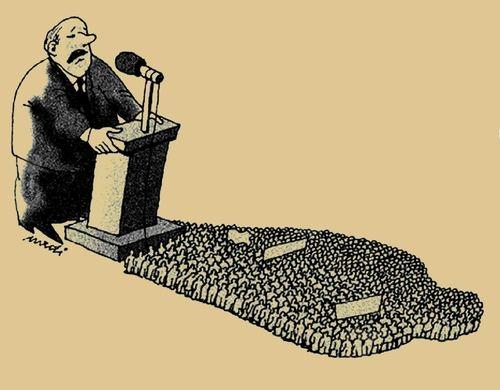When Words are Prey: What Demagogues Do With Words

Image Courtesy: Medi Belortaja | Toon Pool
On this riverbank, saints or thieves
You’ll know as soon as they talk
The character deep within
Comes out by the road of the mouth
(Kabir translated by Linda Hess and Sukhvindar Singh)
Words are the Casualty
The 2019 general elections in India will be remembered for the ugly war of words. It was not so much the clash of titans or the movement of contingents but the deployment of words that set this election apart from other elections in the near past. The war was not a poetic duel but an anti-poetic tirade where words became the ultimate sacrifice. While leaders, party workers, media personnel and security forces were camped out on the ground, the real elections were being fought with words. Words created mobs, mobs created words.
It looks odd to talk about words when people are being lynched in the streets. But we need to understand that the assault on words is not isolated from the lynching in the streets. In other words, the assault on words and the assault on life are inseparable acts. Victims have to be branded before they are lynched. Words must be disfigured before people are.
Words create space for communication. But when they are used as curses they eliminate the scope for any reasonable dialogue. Curses have only one form — the monologue. They result from extreme hate. We have seen how leaders like Pragya Thakur began their political careers with curses. She openly said that she had cursed Hemant Karkare. In such acts of hatred, it is not only the opponent who suffers but also the words.
Do words suffer? What happens to them? How have words changed in the last five years? One can observe that the meanings of some words have radically changed. Words like “republic”, “nation” and “democracy” have been twisted beyond recognition. Words and expressions such as “anti-national” and “tukde-tukde gang” were so viciously used in hate speeches that they became venom in the form of words. Words were morphed, misconstrued and robbed of their meaning. Some words have acquired new meanings which negate their very essence. We all know what has happened to beautiful words like faqirs, jogis and sadhus. Terms like vikas (development), mann ki baat (from the heart) and acche din (good days) have met a similar fate. The twisted, negated meanings have also been given a new force. It is through this intensified distortion that the bhakts have crafted a cult of opposition to any form of knowledge.
It is often said that demagogues do things with words – rhetoric, flattery, false claims and even surgical strikes. They do more than that, however. Words are not only means in the hands of demagogues; words are also hunted down by them. Words fall prey to the politics of demagoguery.
Before we move forward, let us see how our saints, poets and philosophers have used words to transform the world or create alternative ones. Often, these worlds did not exist in reality but only in aspiration and imagination. Words were their very soul.
Words of the Poets, Healers and Philosophers
There are many names for “word” in Indian languages: shabda, vak, labz, bani, bol, vachana and several others. These names stand for truth, for promise and for greater evidence. They cannot be simply reduced to device, rhetoric, medium and discourse. Words have utmost importance in both elite and subaltern communities in India. One can think of shabd-Brahma and Nama-shabda as examples. Though several saints and poets were against texts, they were rarely against words. They saw creation, power and wisdom in words. They regarded words as jiva or life. They took words to be pramana or evidence. Sufis and saints perceived echoes of words pervading the universe through the nada (the unstuck sound). They saw life in words. It is through words that poets created their life-world. They saw words as characters dancing on the canvass. Saint-poets also warned against the use of words for self-praise. Kabir said, “utter only such words which are deprived of all your bodily pride.” The question that needs to be asked is what happens when words become expressions of bodily pride. Do they lose their essence, their vibrancy? Famous balladeer Gaddar from Telangana once told me, “You and I use words in ways which are different. For you, the academic, words are merely numbers to finish an essay of 1500 words. I see life in every word.”
Words also have supreme significance in the magico-ritual world. Shamans heal through words; magicians strike through words; devotees call upon their gods through words. Words have been so important in the life of the Indian people that one mistaken utterance could work as an annihilating force. Spirits and energies have been thought to be embodied in words. Poets and healers have shown that words can be slayed. They can be exterminated, wounded, or emptied of their spirit. The magical shabd-baan (word-arrow) can not only hurt the lover and the enemy, it can also injure words.
Activists and philosophers who dreamt about changing the world used words very carefully. Words were like pearls in their threads. They were stringing words together as they were stringing the broken pieces of life and struggles. It is said about Walter Benjamin that he rarely used words unnecessarily. Marx’s writings interweave life and words so intricately that the reader wonders whether she is reading a text or a life. Sartre’s The Words shows his quest for freedom and truth. Ambedkar’s Annihilation of Caste is not only an attack on the caste system but also an onslaught on the words that underpin that system. For activists and philosophers, words are full of life and action. Words go beyond dreary seminar papers and their word limits. They are compelling statements on life and death. They are powerful. It was the power of words that led to the killing of rationalists and truth-seekers like Kalburgi, Pansare and Lankesh.
Words of the Demagogue
While politics is not just about words, words do play a central role. It is the word that imagines the alternative world in the first instance. Martin Luther King’s speech “I have a dream” was first enacted in words before it spilled out into the streets. It was for the word that he was killed. The word is a question of life and death in a conscious society.
Words have been the real captives under the neoconservative and neoliberal regime of Modi. Therefore, whether it happened in reality or not, the surgical strike did happen in the realm of words. It was an operation carried out on words. Thus, under the current regime, not only are democracy, institutions and the constitution at stake, but so also are words. Words become the first victim when sensible and democratic voices are choked. It is the name and the act of naming that first reaches the mobs before the mobs reach the victims.
Coming back to the fundamental question — what a demagogue does with words — I delineate five major tricks that demagogues play with words and which Modi has mastered with resounding success. It is these maneuvers that make the current war on language such a lethal one.
First, demagogues are adept at extracting words from their established contexts and meanings. They give new colour to words. They cut words from daily life and struggle and transport them to divine, magical and corporate realms. Divyang, meaning “divine body”, and Swachh Bharat, meaning “a clean India”, are some of the best examples of this act. Further, Modi has a knack for creating populist false etymologies using acronyms. He successfully creates nomina sacra (sacred names) through new symbolisms that resonate with a neo-conservative corporate culture. A telling example is Modi’s acronym for the Mars Orbiter Mission — MOM. “I was sure Mom won’t disappoint us,” said Modi after the success of the mission. In one stroke, the idea of the mission, and the ideal of the mother, are stripped of their established implications and fused together to form a conservative propaganda motif. Another instance worth citing is the statement – “Farmers are my TOP priority. TOP stands for Tomato, Onion, Potato.” The very act of coining the acronym is being showcased here as Modi’s efforts at addressing the interests of farmers. Sadly, however, this TOP cannot be eaten – it is simply an empty and sadistic rhetorical ploy.
Second, when demagogues speak in monologue, the words often serve as nothing but cannon fodder. They shut up any space for dialogue and eliminate the possibility of debate. Demagogues and rabble rousers use poisonous invective to paralyse reasoned argument.
Third, demagogues often perform incantations in the emerging public sphere that would earlier be confined to the domain of ritual and prayer. Today such incantations – chants of “Jai Shri Ram” etc – are being performed in parliament. When words and phrases become incantation, they are primarily used to charm and fantasize the masses, and to deflect them from reasoned deliberation. Incantations could also be in the nature of curses — maledictions that seek to intimidate the truth. In the act of the curse, the words themselves do not remain unaffected. They are poisoned and drained of their life-energies. They become hunting fields for frenzied mobs.
Fourth, demagogues tend to be ruthless slayers of words. They throttle words in quite unbelievable ways. If they want to kill the shabda (word) of Kabir, they will invoke Kabir, but in a way that conjures away the essence of everything the saint-poet said. If they want to kill the spirit of Ambedkar’s politics, they will invoke his words in a way that they become unrecognisable. When the demagogue speaks about farmers’ concerns, one can take it for granted that farmers are under attack. The act of invocation becomes a ritual act of sacrifice in which the invoked figure has to be either sacrificed or contained.
Finally, while the very existence and influence of demagogues rests on claims of transforming the system, they are, in reality, afraid of any change that would genuinely serve the people and thus make their posturing redundant. The demagogues zealously guard their public image which they have carefully constructed through words. Words have given them the ability to project a false aura of selflessness and sacrifice. Any challenge to this image-mongering is dreaded by the demagogue. Such a challenge, of course, requires many things. But foremost among them is the task of reclaiming words and their usage from the cynical sway of demagoguery. Our poets, writers and activists would of course have to play a key role in this. They would have to reclaim words not just by restoring and reinventing their worlds of meaning, but also by clearing away the ugly curses and incantations that menace the public sphere today.
Brahma Prakash is Assistant Professor of Theatre and Performance Studies at the School of Arts and Aesthetics, Jawaharlal Nehru University, New Delhi.
Get the latest reports & analysis with people's perspective on Protests, movements & deep analytical videos, discussions of the current affairs in your Telegram app. Subscribe to NewsClick's Telegram channel & get Real-Time updates on stories, as they get published on our website.























